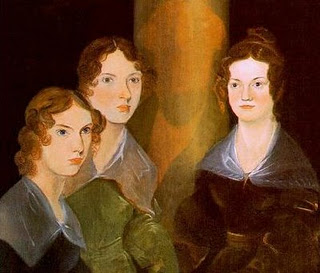 You’re probably familiar with the works of Charlotte and Emily Bronte; but what you may not know is that they had a younger sister, Anne, who was also a writer. Unfortunately, the successes of her older siblings tended to leave her “outshone” by them. However, I recently came across a poem by Anne Bronte that, while short, is both eloquent and meaningful. The poem is called “Farewell”:
You’re probably familiar with the works of Charlotte and Emily Bronte; but what you may not know is that they had a younger sister, Anne, who was also a writer. Unfortunately, the successes of her older siblings tended to leave her “outshone” by them. However, I recently came across a poem by Anne Bronte that, while short, is both eloquent and meaningful. The poem is called “Farewell”:
Farewell to Thee! But not farewell
To all my fondest thoughts of Thee;
Within my heart they still shall dwell
And they shall cheer and comfort me.
Life seems more sweet that Thou didst live
And men more true Thou wert one;
Nothing is lost that Thou didst give,
Nothing destroyed that Thou hast done.
This poem is enriching in that not only does Bronte accept the fact that she must let her loved one go, but she also recognizes that keeping that person in her thoughts and memories is essential. She courageously says goodbye, crying “Farewell to Thee!” (1), but next, just as valiantly, says, “But not farewell/To all my fondest thoughts of Thee” (1-2). She refuses to dismiss her thoughts about her lost loved one, as painful as it sometimes is to think of them after they are gone. It’s also significant that Bronte capitalizes “Thee,” and “Thou,” rather than leaving them lowercase: it shows that the loved one who has died is important to her, and was not “just anyone.”

The Bronte Sisters
I love that Bronte’s “fondest thoughts” reside in her heart, rather than in her mind. Those that we love never leave our hearts, and so it is fitting that that is where we should hold our memories of them. Bronte expresses even more wisdom when she says, “they shall cheer and comfort me” (4). Remembering those we have lost should not be sad, it should make us feel better, because we got to take part in that person’s life; we had the privilege of making memories with them.
This is the point that Bronte makes in the opening line of the next stanza, when she says, “Life seems more sweet that Thou didst live” (5). Her life was made better because of this person, and this in and of itself is one of the greatest gifts someone can give. Bronte also acknowledges that the one who has passed was one of the most honest, genuine people she has ever known: “And men more true Thou wert one” (6). Her loved one was numbered among the few sincere, authentic people in the world. And yet, she is not simply grieving the loss of such a rare person: she is thankful for the fact that she got to know him at all.
The final two lines of the poem are the most powerful: “Nothing is lost that Thou didst give,/Nothing destroyed that Thou hast done” (7-8). This is an important point, because it shows that just because a person is gone, it doesn’t mean that they didn’t leave an impact during their life. The fact that they are no longer here does not change the fact that they made a contribution to this world. And similarly, though Anne Bronte may be the often “forgotten” Bronte sister, this poem and her other works still live on and haven’t lost any of their value.

 “Farewell” by Anne Bronte
“Farewell” by Anne Bronte



 Composting Bodies Is Now Legal in a Dozen States
Composting Bodies Is Now Legal in a Dozen States
 “Hand to Earth” by Andy Goldsworthy
“Hand to Earth” by Andy Goldsworthy














